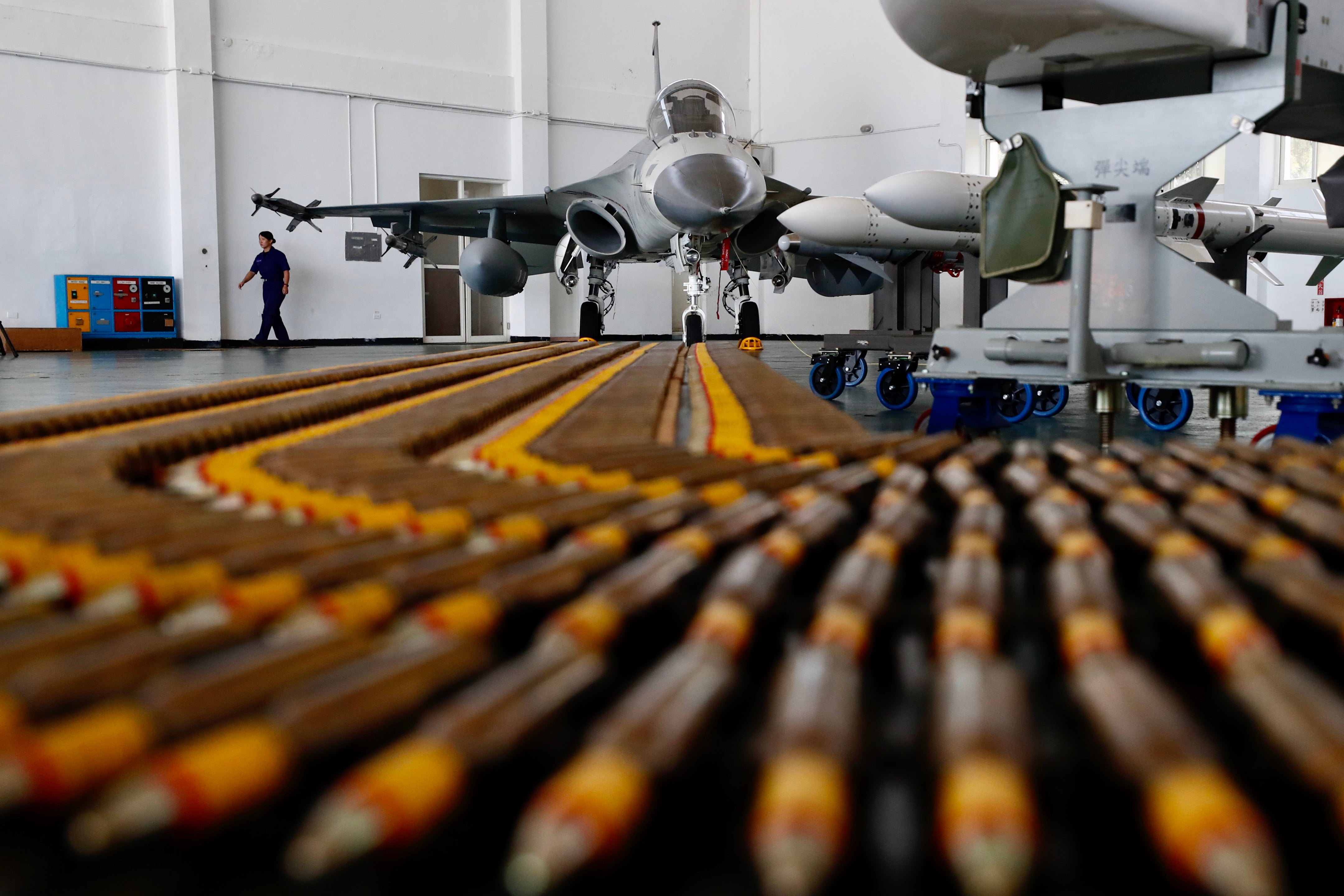Taiwan ponders its military future as tensions with China grow
Taiwan reported its planes had scrambled to safeguard its airspace more than 4,000 times since beginning of year, William Yang reports


Amid increasing military aggression from China over the last few months, Taiwan’s Defence Ministry said the island has launched aircrafts to intercept Chinese fighter jets more than 4,000 times since the beginning of 2020.
According to a report shared with the parliament on Tuesday, Taiwan’s air force has doubled the number of times that they sent aircrafts to safeguard its airspace against possible Chinese intrusion in 2020.
“China is trying to use unilateral military actions to change the security status quo in the Taiwan Strait, and at the same time is testing our response, increasing pressure on our air defences and shrinking our space for activity,” wrote the Taiwanese Defense Ministry in the report.
China’s People’s Liberation Army (PLA) has flown aircrafts into Taiwan’s air defence identification zone (ADIZ) or across the median line of the Taiwan Strait more than a dozen times over the last few months.
“Those provocative actions are aimed at intimidating Taiwan and creating a new routine that gradually deviates from the norm in a bid to squash Taiwan’s defense capabilities,” said Chang Guan-chung, Taiwan’s Vice Defense Minister during a US - Taiwan Defense Industry Conference.
Experts view the growing provocation from China as a sign of Beijing’s anger towards the ever-warming ties between the United States and Taiwan. Washington has sent two high level delegations to Taiwan since August, and on both occasions, Chinese fighter jets entered Taiwan’s ADIZ or crossed the median line of the Taiwan Strait.
“China is using these actions to send a political message to Taipei that they are extremely unhappy about the path that Taiwan is going down at the moment,” said Alexander Huang, strategic studies professor at Tamkang University in Taiwan.
“On the one hand, their actions are part of its psychological operation that aims at touching Taiwan’s nerves. On the other hand, Beijing hopes to send a message to Taiwanese people that they should consider the consequences that might come if they keep going down the current path,” Huang explained to the Independent.
While Taiwanese people are no strangers to military provocation from China, the growing frequency of military actions from the PLA is undoubtedly raising concerns among Taiwanese citizens. China claims Taiwan to be part of its territory, and Beijing has repeatedly emphasized that it would use military force to unite with Taiwan if necessary.
A recent poll conducted by the Chinese Association of Public Opinion Research in Taiwan shows that more than 80 per cent of respondents think China will not militarily invade Taiwan, and close to 50 per cent of them would be willing to join the military if a Chinese invasion happened.
However, Taiwanese citizens remain largely split on whether the cross-Strait tension would develop into an all-out war or not. “I think it’s unlikely that China will militarily invade Taiwan,” said Mr. Huang. “While military invasion is an option for the Chinese government, it will cost them a lot of resources. On top of that, they might not even be able to successfully take over Taiwan.”
Others view Chinese military invasion as a risk that Beijing is willing to take in order to complete its dream of “Chinese unification”.
“I think it’s very likely that China will militarily invade Taiwan,” Ms. Yin told the Independent. “I think we need to maintain a certain level of awareness about a possible Chinese military invasion.”
Last week, Taiwan’s Defense Minister Yen De-fa said during a parliamentary hearing that there is no sign that China is ready to launch an all-out war against Taiwan. “The Chinese communist regime has continued its acts of provocation against Taiwan,” said Yen. “But there are currently no signs showing it is ready to launch a full-scale war.”
Alexander Huang told The Independent that there are two purposes behind China’s increased military aggression in recent months. As the United States tries to expand its footprint in the Indo-Pacific region, Huang thinks China’s growing military aggression is a response to the more proactive U.S. operation.
“China is sending a message to the United States by dispatching military vessels and fighter jets into Taiwan’s vicinity,” Huang told The Independent. “They want Washington to know that all these ‘provocations’ were mere responses to the growing U.S. footprint in the Indo-Pacific region. It is also a countermeasure to the growing military partnership between Taiwan and the U.S.”
Additionally, Huang thinks China is trying to improve PLA’s capability to fight local wars that are beyond its border. “The PLA is pushing their soldiers to acquire these experiences by conducting military exercises in areas around Taiwan,” Huang explained. “When the PLA moves beyond their coastline, the first country that they hit is Taiwan. So no matter how the Chinese government justifies their military actions, they will infringe upon Taiwan’s air defense or ADIZ.”
While Taiwan has been developing different types of systems to counter targeted military actions from China, defense officials in Taiwan still think support from the United States will be crucial to the island’s defense capabilities.
During a conference on Monday, Taiwan’s Vice Defense Minister Chang Guan-chung called for more cooperation between Taipei and Washington that goes beyond arms sales, arguing that regular military collaboration can further energize Taiwan’s military modernization.
Chang called for a whole range of military collaboration that includes training, operation concepts, capability assessment, intelligence sharing and armament cooperation. Alexander Huang told the Independent that it is crucial for Taiwan to focus on further investing resources in education and training.
“Any Arms sales commitment normally needs eight to ten years to transform into actual war fighting capabilities,” Huang explained. “I think Taiwan needs to invest in younger military personnel and noncommissioned officers, because the quality of soldiers is the guarantee of our war-fighting capabilities. Taiwan needs to rebalance its investment between human resources and weapon systems.”
Join our commenting forum
Join thought-provoking conversations, follow other Independent readers and see their replies
Comments


Bookmark popover
Removed from bookmarks